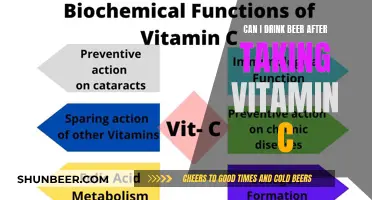
Alcohol can prevent the body from absorbing and using essential vitamins and minerals, which can lead to malnutrition. Alcohol inhibits the absorption of vitamins such as B1 (thiamine), B6, B12, and folic acid, as well as minerals like zinc. Mixing alcohol with certain herbal supplements or vitamins can lead to side effects such as drowsiness, confusion, dizziness, impaired driving ability, and liver damage. It is recommended to consult a doctor or pharmacist to determine any possible risks associated with combining alcohol and supplements. To avoid negative interactions, it is suggested to consume supplements with food and water at least an hour before or after drinking alcohol.
| Characteristics | Values |
|---|---|
| Alcohol's effect on vitamin absorption | Alcohol prevents the body from absorbing vitamins and minerals, potentially leading to malnutrition. |
| Vitamins affected by alcohol | B vitamins (B1, B6, B12), folic acid, and zinc |
| Recommended intake of vitamins with alcohol | It is not recommended to take vitamins with alcohol. It is advised to take vitamins with food and water at least an hour before or after consuming alcohol. |
| Alcohol's nutritional value | Alcohol has no protein, fats, vitamins, or minerals but contains carbohydrates and 7 calories per gram. |
| Effect of alcohol on health | Alcohol can cause dehydration, weight gain, and liver damage. |
What You'll Learn
- Alcohol inhibits the absorption of vitamins and minerals, potentially leading to malnutrition
- Alcohol and herbal supplements can interact dangerously, causing drowsiness, confusion, and dizziness
- Alcohol has no nutritional value and is a source of empty calories
- Alcohol impairs the secretion of digestive enzymes from the pancreas
- Alcohol consumption can cause anemia and neurological problems

Alcohol inhibits the absorption of vitamins and minerals, potentially leading to malnutrition
When the liver processes alcohol, the body's ability to maintain stable blood sugar levels is affected. Alcohol irritates the gastrointestinal system, increasing acid secretion by the stomach, which can injure the lining of the small intestine and interfere with the absorption of vital nutrients. Alcohol also interferes with the absorption and storage of vitamins B12, folate, and vitamin A. It triggers the release of large doses of vitamin A into the bloodstream, causing a slight, temporary sharpness of vision followed by night blindness.
Alcohol is a diuretic that increases urine output, leading to the loss of water-soluble minerals such as zinc, magnesium, and potassium. Zinc deficiency, in particular, interferes with the ability to taste and smell, further limiting dietary intake. Alcohol also inhibits the secretion of digestive enzymes from the pancreas and impairs nutrient absorption by damaging the cells lining the stomach and intestines.
Chronic heavy drinking can cause vitamin deficiencies by impairing the absorption, metabolism, and utilization of vitamins. Alcohol consumption can lead to deficiencies in vitamin A, C, D, E, K, and B vitamins. These deficiencies can cause night blindness, softening of bones, slow wound healing, decreased blood clotting ability, and severe neurological damage. Alcohol-related problems, such as fat malabsorption, poor diet, vomiting, diarrhea, and gastrointestinal bleeding, contribute to mineral deficiencies, including calcium, magnesium, iron, and zinc.
Beer Tube Screens: How Do They Work?
You may want to see also

Alcohol and herbal supplements can interact dangerously, causing drowsiness, confusion, and dizziness
While drinking beer after taking vitamins is not inherently dangerous, chronic alcohol consumption inhibits the absorption and usage of vital nutrients, including folic acid, zinc, vitamin B12, and thiamin (vitamin B1). This means that even if you are taking vitamin supplements, your body may not be able to absorb them properly if you are drinking alcohol.
Additionally, alcohol can have negative interactions with certain herbal supplements, leading to dangerous side effects. For example, supplements like St. John's Wort, melatonin, valerian, and kava kava may interact with alcohol and lead to drowsiness, confusion, dizziness, impaired driving, liver damage, or other side effects.
It is important to note that well-designed clinical trials evaluating interactions between dietary supplements and alcohol use are often lacking. Therefore, if you are taking any herbal supplements or vitamins, it is always best to check with your doctor or pharmacist to determine if there is a possible risk when combining them with alcohol.
In general, it is advisable to use caution when combining alcohol with any over-the-counter herbal or dietary supplement that causes drowsiness. Be sure to review the label on the bottle and speak with your pharmacist or doctor if you plan on mixing an herbal dietary supplement with alcohol. Do not drive, operate machinery, or perform other hazardous activities if you have been drinking or if your supplement makes you feel tired.
STD Shots and Beer: What's Safe?
You may want to see also

Alcohol has no nutritional value and is a source of empty calories
Alcohol inhibits the absorption and usage of vital nutrients, including folic acid, zinc, vitamin B12, and thiamin (vitamin B1). These nutrients are essential for various bodily functions. For example, thiamin is involved in metabolising carbohydrates, proteins, and fats, as well as forming hemoglobin. Vitamin B12 is crucial for maintaining healthy red blood and nerve cells. Folic acid plays a role in forming new cells, and zinc is essential for energy metabolic processes.
The high calories in alcohol are not available to our muscles and cannot be converted to glycogen, a stored form of carbohydrates. Therefore, alcohol is not a good source of energy during exercise. Each drink contains approximately 100-150 empty calories, which the body treats as fat, converting alcohol sugars into fatty acids. This can lead to weight gain, especially since these empty calories are often consumed in excess without a person realising it.
Alcohol also disrupts sleep cycles, affecting the brain's ability to learn and retain information. It impedes muscle growth and recovery by decreasing protein synthesis and causing dehydration, which slows the body's ability to heal. Additionally, alcohol interferes with the production of testosterone and human growth hormone (HGH), both crucial for muscle development and repair.
BeerSmith Compatibility: Apple Devices and Beyond
You may want to see also

Alcohol impairs the secretion of digestive enzymes from the pancreas
Alcohol abuse is the leading cause of chronic inflammation of the pancreas, or chronic pancreatitis. The pancreas is a large organ located in the back of the abdomen, directly behind the stomach. It has several important functions, including the release of digestive enzymes and exocrine hormones involved in blood sugar regulation.
The pancreas contains a specialised group of cells called acinar cells, which produce digestive enzymes that are secreted into the small intestine through the pancreatic ducts. These enzymes aid in the digestion of carbohydrates and proteins and help break down fats.
Alcohol exerts a number of toxic effects on acinar cells. Notably, these cells have been shown to metabolise alcohol via both oxidative and non-oxidative pathways. The oxidative pathway is catalysed predominantly by the enzyme alcohol dehydrogenase, while the non-oxidative pathway involves a chemical reaction of ethanol with fatty acids, resulting in the formation of fatty acid ethyl esters.
Alcohol has a biphasic effect on pancreatic enzyme secretion. In the early stages of alcohol intake, the protein and trypsinogen concentrations of the pancreatic juice increase. However, as alcohol consumption becomes chronic, these enzyme concentrations diminish. The decrease in enzyme secretion after prolonged alcohol intake may be due to acinar cell injury.
Chronic alcohol consumption interferes with the two major pathways that regulate the secretion of pancreatic enzymes: the cholinergic pathway and the cholecystokinin pathway. Alcohol-induced alterations in the control of pancreatic secretion hyperstimulate acinar cells and their muscarinic receptors. This hyperstimulation can lead to recurrent injury to acinar cells, resulting in chronic pancreatitis.
The effects of alcohol on the pancreas can lead to acute and chronic changes, including inflammation, irreversible damage, and dysfunction. The damaged pancreatic tissue promotes inflammation, which further exacerbates the damage to the pancreas. This can result in inadequate pancreatic digestive enzyme secretion, improper food digestion, progressive nutritional deficiencies, impaired glucose metabolism, and an increased risk of developing diabetes and pancreatic cancer.
Therefore, alcohol impairs the secretion of digestive enzymes from the pancreas by disrupting the normal functioning of acinar cells and the regulatory pathways involved in enzyme secretion. The negative consequences of alcohol consumption on the pancreas highlight the importance of abstaining from alcohol to maintain pancreatic health.
The Science of Beer Tubes: How Do They Work?
You may want to see also

Alcohol consumption can cause anemia and neurological problems
Chronic alcohol use can result in vitamin B and folate deficiencies, which are crucial for the healthy production and function of red blood cells. Alcohol misuse often leads to malnutrition, further impacting red blood cell production and resulting in anemia. Additionally, alcohol abuse can damage the digestive system, impairing the body's ability to absorb nutrients from food.
Neurological problems associated with alcohol consumption include damage to the nervous system, memory loss, and an increased risk of developing Wernicke-Korsakoff syndrome (WKS). WKS is a condition caused by thiamine deficiency, which is common in individuals with a history of chronic alcohol consumption. The nervous system relies on thiamine for proper functioning, and a deficiency can lead to cognitive and motor function impairments.
Alcohol can also interfere with the absorption of iron and other nutrients, further exacerbating anemia and impacting overall health. It is important for individuals with anemia to refrain from alcohol consumption to prevent complications and worsening of symptoms. Seeking professional help and support is crucial in addressing alcohol dependence and improving overall health outcomes.
While vitamin supplements can be beneficial during recovery, they are most effective when alcohol consumption has ceased. The harmful effects of alcohol on the body and mind are significant, and the risks associated with alcohol use disorder extend beyond health, impacting relationships, family, career, and personal goals.
Pouring Beer: Catfish Bait or Urban Myth?
You may want to see also
Frequently asked questions
It is not recommended to mix alcohol with vitamins. Alcohol inhibits the absorption of essential vitamins and minerals, potentially leading to malnutrition. It is best to take vitamins with food and water, at least an hour before or after consuming alcohol.
Alcohol prevents the body from properly absorbing and using many essential vitamins and minerals, which can lead to vitamin deficiencies and malnutrition. Alcohol also provides empty calories, which can contribute to weight gain. Additionally, mixing alcohol with certain herbal supplements can lead to drowsiness, confusion, dizziness, impaired driving, liver damage, and other side effects.
While there are no vitamins that can completely offset the negative effects of alcohol, taking a multivitamin can help ensure you're getting an extra boost of nutrients. However, it is important to drink in moderation and to prioritize a healthy diet.







